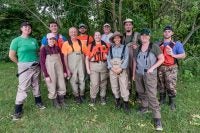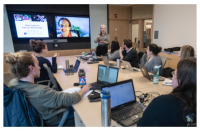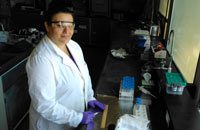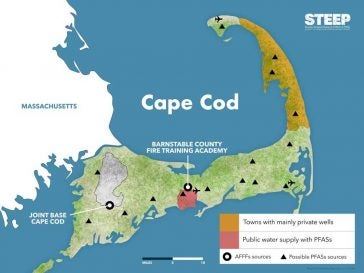September 2018 Newsletter
From the Director
Welcome to the STEEP Newsletter
 Welcome to the 1st newsletter from the STEEP Center (Sources, Transport, Exposure and Effects of PFAS) led by the University of Rhode Island, in collaboration with the Harvard T.H. Chan School of Public Health (HSPH) and Silent Spring Institute. Active since last fall, the initiative has already received support and engagement from the Cape Cod community toward the multidisciplinary, collaborative research that the Center embodies. We are delighted to share news of our Center activities. Like all Centers, we have been busy, but co-Director Philippe Grandjean (HSPH) keeps us motivated with chocolates from his homeland of Denmark. Read More…
Welcome to the 1st newsletter from the STEEP Center (Sources, Transport, Exposure and Effects of PFAS) led by the University of Rhode Island, in collaboration with the Harvard T.H. Chan School of Public Health (HSPH) and Silent Spring Institute. Active since last fall, the initiative has already received support and engagement from the Cape Cod community toward the multidisciplinary, collaborative research that the Center embodies. We are delighted to share news of our Center activities. Like all Centers, we have been busy, but co-Director Philippe Grandjean (HSPH) keeps us motivated with chocolates from his homeland of Denmark. Read More…
 Research Highlights
Research Highlights
Modeling Human Exposure to PFAS from Source to Dose
 Poly- and perfluoroalkyl substances (PFAS) are detectable in virtually all Americans. Pathways for human exposure to these man-made compounds include marine foods, drinking water, and consumer goods, and exposure has been linked to health problems. What are the relative contributions of multiple exposure pathways? Where are the potential contamination “hot spots”? What is the future trajectory of PFAS exposures? STEEP scientists Are using correlations among multiple chemical homologues in environmental samples that contain information on their origin. This process is referred to as “chemical fingerprinting”. Read More…
Poly- and perfluoroalkyl substances (PFAS) are detectable in virtually all Americans. Pathways for human exposure to these man-made compounds include marine foods, drinking water, and consumer goods, and exposure has been linked to health problems. What are the relative contributions of multiple exposure pathways? Where are the potential contamination “hot spots”? What is the future trajectory of PFAS exposures? STEEP scientists Are using correlations among multiple chemical homologues in environmental samples that contain information on their origin. This process is referred to as “chemical fingerprinting”. Read More…
Update from the Field: STEEP Summer Research Continues
 Harvard University STEEP trainee is in the field with United States Geological Survey (USGS) and the Houlton Band of Maliseet Indians, collecting river water samples. Read More…
Harvard University STEEP trainee is in the field with United States Geological Survey (USGS) and the Houlton Band of Maliseet Indians, collecting river water samples. Read More…
 Events
Events
PPTOX VI Conference, Faroe Islands
 STEEP Co-Director Dr. Philippe Grandjean co-organized PPTOX VI Conference (prenatal programming & toxicity) in May in Tórshavn, Faroe Islands, a STEEP community. The conference assessed the weight of evidence and highlighted new achievements on the effects of prenatal and early postnatal exposure to toxicants, as well their effects on the development. PFAS were a major focus of the conference as the Faroese are exposed to PFAS through their traditional dietary habits of consuming pilot whale meat and blubber, in addition to consumer products. Read More…
STEEP Co-Director Dr. Philippe Grandjean co-organized PPTOX VI Conference (prenatal programming & toxicity) in May in Tórshavn, Faroe Islands, a STEEP community. The conference assessed the weight of evidence and highlighted new achievements on the effects of prenatal and early postnatal exposure to toxicants, as well their effects on the development. PFAS were a major focus of the conference as the Faroese are exposed to PFAS through their traditional dietary habits of consuming pilot whale meat and blubber, in addition to consumer products. Read More…
Spring Colloquium On PFAS
 STEEP organized a semester-long Colloquium on PFAS at the University of Rhode Island to provide our trainees unique opportunities to explore all aspects of PFAS in one course sequence. The Colloquium focused on sharing knowledge and research on topics ranging from physiochemical properties and direct detection and remediation, to communicating science to affected communities, social justice, and policy. Speakers included STEEP scientists, Core leaders, and invited guests. Read More…
STEEP organized a semester-long Colloquium on PFAS at the University of Rhode Island to provide our trainees unique opportunities to explore all aspects of PFAS in one course sequence. The Colloquium focused on sharing knowledge and research on topics ranging from physiochemical properties and direct detection and remediation, to communicating science to affected communities, social justice, and policy. Speakers included STEEP scientists, Core leaders, and invited guests. Read More…
STEEP at SETAC, Rome
 STEEP scientists organized a session at the SETAC (Society of Environmental Toxicology and Chemistry) Europe 28th Annual Meeting in May on “From Detection to Action: Advancements in Assessing and Managing Highly Fluorinated Compounds”. With 28 presentations the session addressed monitoring and modeling efforts to better quantify exposure to PFAS and associated health impacts., and highlighted the important scientific challenges faced by society in managing the entire class of PFAS. Read More…
STEEP scientists organized a session at the SETAC (Society of Environmental Toxicology and Chemistry) Europe 28th Annual Meeting in May on “From Detection to Action: Advancements in Assessing and Managing Highly Fluorinated Compounds”. With 28 presentations the session addressed monitoring and modeling efforts to better quantify exposure to PFAS and associated health impacts., and highlighted the important scientific challenges faced by society in managing the entire class of PFAS. Read More…
 Program Updates
Program Updates
Jitka Becanova (URI) receives SRP K.C. Donnelly Externship Award
 Congratulations to STEEP postdoctoral researcher Jitka Becanova (URI) for receiving the SRP K.C. Donnelly Externship Award. For her externship, Jitka will work with Dr. Robert Hurt at the Brown University SRP Center in Providence, RI to study the sorption behavior of PFAS on advanced graphite-based nanomaterials. The aim of Dr. Becanova’s work is to develop and test different nanographenes as passive samplers for detecting PFAS. Read More…
Congratulations to STEEP postdoctoral researcher Jitka Becanova (URI) for receiving the SRP K.C. Donnelly Externship Award. For her externship, Jitka will work with Dr. Robert Hurt at the Brown University SRP Center in Providence, RI to study the sorption behavior of PFAS on advanced graphite-based nanomaterials. The aim of Dr. Becanova’s work is to develop and test different nanographenes as passive samplers for detecting PFAS. Read More…
 Community News
Community News
STEEP Hosts a Science Day On Cape Cod
 Poly- and perfluoroalkyl substances (PFAS) are detectable in virtually all Americans. Pathways for human exposure to these man-made compounds include marine foods, drinking water and consumer goods, and exposure has been linked to health problems. What are the relative contributions of multiple exposure pathways? Where are the potential contamination “hot spots”? What is the future trajectory of PFAS exposures? STEEP scientists Are using correlations among multiple chemical homologues in environmental samples that contain information on their origin. This process is referred to as “chemical fingerprinting.” Read More…
Poly- and perfluoroalkyl substances (PFAS) are detectable in virtually all Americans. Pathways for human exposure to these man-made compounds include marine foods, drinking water and consumer goods, and exposure has been linked to health problems. What are the relative contributions of multiple exposure pathways? Where are the potential contamination “hot spots”? What is the future trajectory of PFAS exposures? STEEP scientists Are using correlations among multiple chemical homologues in environmental samples that contain information on their origin. This process is referred to as “chemical fingerprinting.” Read More…
Well Water Testing Program
 Private well owners are not required to test for PFAS, so there is little information about the extent of PFAS contamination in Cape Cod private wells. Launched in April, CEC will be testing for PFAS in 50 private wells each year throughout Cape Cod. The goals of the program are to better understand the extent of PFAS exposure and detect potential sources of groundwater contamination. Read More…
Private well owners are not required to test for PFAS, so there is little information about the extent of PFAS contamination in Cape Cod private wells. Launched in April, CEC will be testing for PFAS in 50 private wells each year throughout Cape Cod. The goals of the program are to better understand the extent of PFAS exposure and detect potential sources of groundwater contamination. Read More…
Read the 2025 Issue 1 Newsletter
Read the 2024 Issue 2 Newsletter
Read the 2024 Issue 1 Newsletter
Read the Spring/Summer 2023 Newsletter
Read the Spring/Summer 2023 Newsletter
Read the Winter 2023 Newsletter
Read the Winter 2022 Newsletter
Read the Spring 2021 Newsletter

